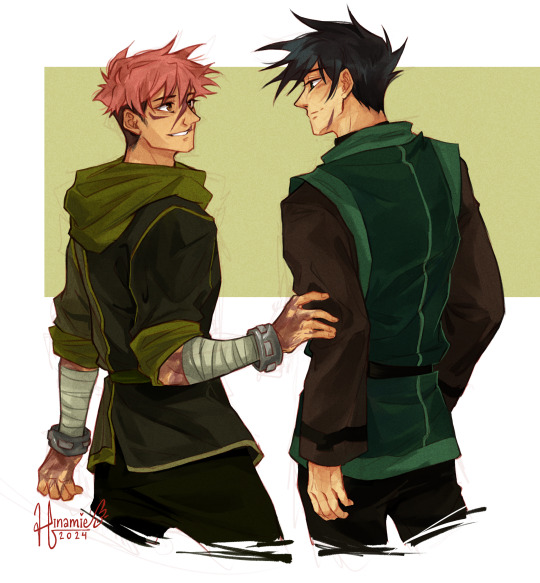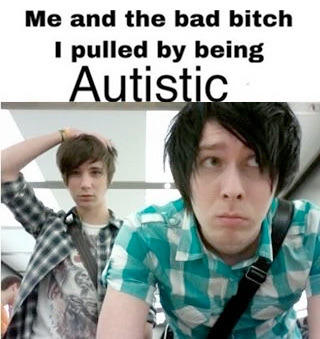#i could have sworn i posted this >_>
Explore tagged Tumblr posts
Text

truth is, I used to dream about boys like you
jjk atla!au with @philosophiums
#my art#jujutsu kaisen#jjk#itafushi#fushiguro megumi#itadori yuuji#fanart#jjk fanart#jjk atla!au#atla!au: art#atla!au: illust#lmhs#timelapse#2.5 hours niCE#i mean its still 2am but it could be and has been worse#realized while looking at this tht this au has Vastly increased both my use of and love for the colour green#she will never dethrone red but she definitely gets the award fr most improved#megumi especially looks . sososo good in green which is unsurprising but i am surprised anyway#speaking of megu#i love th timelapse feature so much u get to see me fighting fr my life with yuuji fr like 20 minutes then get megumi first try#there's a reason i needed a ref sheet for yuuji and not megumi. drawing megu is like riding a bike fr me#like minor adjustments r inevitable but his overall face/hair/expression come so easily and i love him all the more for it#anyway#i could have sworn i used adonis fv lyrics for a caption before??? it was so long ago#i guess i must have changed my mind on tht other post bc adonis remains free real estate >:3#PLEASE listen 2 adonis fv........pls i beg.....pls it is so itfs coded.......#hina pleading fr someone anyone to listen to former vandal goes unanswered episode 542346 :(((
2K notes
·
View notes
Text


Yes yes we all know about the battle diagrams and potions in Kieran’s room but I would like to draw some attention to the massive amount of chocolate wrappers, the soda bottles in his sink and the dying house plant.
This is exactly what an unsupervised 14 year olds room should look like
#I could have sworn I posted about this before but ig not?#pokemon#pokemon scarlet#pokemon indigo disk#kieran pokemon#midnight speaks
1K notes
·
View notes
Text

comment 'chug' to chug
#qgotfat#fat belly#feedee belly#feedist#gaychub#chub#male wg#fat gainer#make me fatter#oops forgot to post this tummy tuesday pic here i guess? could have sworn i did
645 notes
·
View notes
Photo



my favorite binnie looks (257/∞)
#stray kids#changbin#seochangbinet#createskz#bystay#staysource#jypartists#malegroupsnet#seo changbin#stray kids gifs#stray kids changbin#skz#my.gifs#favoritebinnies#could have sworn i posted this before but .. ig not? if i have pls let me know. it's been in my drafts for forever
642 notes
·
View notes
Text

flutterbug
#I COULD HAVE SWORN I ALREADY POSTED THIS BUT. idk i guess i probably posted it to some other account idk#ANYWAY!#mlp#my little pony#fluttershy
2K notes
·
View notes
Text
Disability Tropes: The Miracle Cure
The miracle cure is a trope with a pretty negative reputation in disability circles, especially online. It describes a scenario in which, a disabled character, through either magic, advanced technology, divine intervention or some combination of the three, has their disability cured throughout the course of the story. Sometimes this is literally, as in the disability is completely and entirely cured with no strings attached. Other times, it looks like giving an amputee character a prosthetic so advanced that it's basically the same as "the real thing" and that they never take off or have any issue with, or giving the character with a spinal injury an implant that bypasses the physical spine's break, or connects to an exoskeleton that allows them to walk again. Sometimes, it can even look like giving a character some kind of magic item or power that negates the effects of the disability, like what I talked about in my post about "the super-crip" trope. Either way though, the effect is the same: The disability is functionally cured and is no longer an "issue" the author or character has to worry about.
But why would this be a bad thing? In a world with magic or super-advanced tech, if you can cure a character's disability, why wouldn't you?

[ID: a screenshot of Roy mustang from Full metal alchemist Brotherhood, a white man with short black hair in a hospital gown. In the corner of the screen is the hand of another person holding a small red gemstone. /End ID]
Well there's a few reasons. First, lets talk about the purely writing related ones. If you've been around the writing or even media critique communities for a bit, you've likely heard people voicing their frustrations with tropes like "The fake-out death" where a character is either implied to have died, but comes back later, or is explicitly shown to be dead and then resurrected. Often when this happens in media, it leaves the audience feeling cheated and like a character's actions and choices don't really matter if even the worst mistakes and consequences can be undone. In the case of the latter situation, where they die and are brought back, it can make the stakes of the whole story feel a lot lower, since even something like death is shown to be reversible, so the audience doesn't really have to worry about anything bad happening to their favourite character, and once you've used this trope one time, people will constantly wonder why you wouldn't use it every time it comes up.
The same is true for "fixing" a character's disability. It sets a precedent that even things as big and life-changing as disability aren't permanent in this setting. We don't have to worry about anything major happening to the characters, there's no risks associated with their actions if it can all be undone, and it will lower the stakes of the story for your audience. Personally, I also feel like it's often used as a cop-out. Like writers wanted to include a major injury the leads to something big like disability for shock value, but weren't sure how to actually deal with it afterwards, so they just made it go away. Even in cases where the character start the story with a disability and are cured, this can still cause issues with your story's stakes, because again, once we've seen you do it once, we know its possible, so we won't feel the need to worry about anything being permanent.
Ok, so that's the purely writing related reasons, but what if that situation doesn't apply to the story you're writing? What if they're "fixed" right at the end, or the way they're cured is really rare, so it can't be used multiple times?
I'm glad you asked, because no, this is far from the only reason to avoid the trope! In my opinion, the more important reason to avoid it is because of how the a lot of the disabled community feels about the miracle cure trope, and the ideas about disability it can perpetuate if you're not very, very careful.
You might have noticed that throughout this post, I've put words like "cured" and "fixed" in quotes, and that's because not every disabled person wants a cure or feels like their ideal to strive for is able-bodied and neurotypical. For many of us, we have come to see our disabilities as part of us, as part of our identities and our sense of self, the same way I, as a queer person might see my queerness as a part of my identity. This is an especially common view among people who were born with their disability or who had them from a young age, since this is all they've ever really known, or who's disability impacts the way they think, perceive and process the world around them, how they communicate with people or in communities who have a long history of forced conformity and erasure such as the autism and deaf communities. Many disabilities have such massive impacts on our lives that we literally wouldn't be who we are today if they were taken away. So often though, when non-disabled people write disabled characters, they assume we'd all take a "cure" in a heart-beat. They assumed we all desire to be just like them again, and this simply isn't the case. Some people absolutely would, and there's nothing wrong with that, but it's not as universal as media representation makes it out to be.
Another reason it's so heavily disliked is because this trope is often used in conjunction with other ableist and harmful tropes or it's used in ways that perpetuate misinformation about living with a disability and it can have ableist implications, even if that's not what the author necessarily intended.
If the miracle cure is used right at the end of the story for example, as a way to give characters a happy ending it can imply that the only way for a disabled character to be happy in the long run, is for them to be "fixed", especially if they were miserable all the way up until that point. If it's used earlier in the story as a way to get said character back into the action, it can also be read as the author thinking that disabled people can't be of use to the plot, and so the only way to keep them around is to "fix" them.
Of course, there's also the fact that some authors and writers will also play up how bad being disabled is in order to show why a cure is justified, playing into the "sad disabled person" trope in the process, which is pretty much what it says on the tin. Don't get me wrong, this isn't to say that being disabled is all easy-breezy, there are never any hard days and you should never show your character struggling, not at all, the "sad disabled person" trope has it's place (even if I personally am not a fan on it), but when both the "sad disabled person" trope and the miracle cure trope are used together, it's not a great look.
This is especially bad when the very thing that cures the disability, or perhaps the quest the heroes need to go on to get it, is shown to be harmful to others or the disabled person themselves. Portraying living with a disability as something so bad that it justifies hurting others, putting others at risk, loosing yourself or killing yourself in order to achieve this cure perpetuates the already harmful idea that disability is a fate worse than death, and anything is justified to avoid it.
I've also noticed the reasons the authors and writers give for wanting to cure their characters are very frequently based on stereotypes, a lack of research in to the actual limits of a person's disability and a lack of understanding. One story I recall reading years ago made sure to tell you how miserable it's main character, a former cyclist, was because he'd been in a car accident where he'd lost his arm, and now couldn't ride bikes anymore, seemingly unaware of the fact arm amputees can, in fact, ride bikes. There are several whole sports centred around it, and even entire companies dedicated to making prosthetic hands specifically for riding bikes. but no, the only way for this to resolve and for him to be happy was to give him his arm back as a magical Christmas miracle! It would be one thing if the story had acknowledged that he'd tried cycling again but just had difficulties with it, or something was stopping him from being able to do it like not being able to wear the required prosthetic or something, but it really did seem as though the author was entirely unaware it was even possible, which is an issue when it's the whole point of your story existing. This happens a lot more often than you'd think, and it's very clear when an author hasn't even bothered to google search if their character would be able to do something before deciding the only solution is to take the disability away.
There's also the frustration that comes from being part of an underrepresented minority, finally seeing a character like you on screen or in a book, only for that representation to be taken away. Disabled people make up roughly 16% of the population (though many estimate these numbers are actually much higher), but only about 2.8% of American TV shows and 4.1% of Australian TV shows feature explicitly disabled characters. In 2019, around 2.3% of films featured disabled characters in a speaking roll, and while it's slowly getting better as time goes on, progress on that front is very slow, which is why its so frustrating when we do see characters like ourselves and so much of their stories focus on wishing to be, trying to become or actually being "cured".
An finally, there's the fact this is just a really common trope. Even if we ignore the issues it can cause with your story's tone and stakes, the harm it can do to the community when not handled with care, the negative perceptions it can perpetuate and everything else. It's just a plain-old overdone trope. It shows up so often that I, and a lot of disabled people, are just getting tired of seeing it. Despite everything I've said, there are valid reasons for people to not want to be disabled, and just like how I made sure to emphasise that not everyone wants a cure, it's important to recognise that not everyone would refuse it either. So long as it's not done in a way that implies it's universal, in theory, depicting someone who would want and accept a cure is totally fine. The issue is though that this trope is so common and so overdone that it's starting to feel like it's all we ever see, especially in genres like sci-fi and fantasy (and also Christmas movies for some reason).

[ID: A Gif of a white man in a top hat nodding his head with the caption "Merry Christmas" down the bottom. /end ID]
Personally, because it's so common, I find even the few examples of the trope used well frustrating, and I honestly feel that it's at the point where it should be avoided entirely where possible.
Ok but Cy, you mentioned there are ways to use this trope well, what are they?
So, like I said, I'm of the opinion that this trope is better off not being in your work at all, but if, for whatever reason, you can't avoid it, or it's use is really that important to the story you want to tell, there are less harmful ways to implement it.
Don't have your only disabled character take the cure
If you really must cure your disabled character's disability, don't make them the only disabled person in the story. Show us another character who, when offered the same cure, chooses not to take it. This at least helps push back a little against the assumption of "of course everyone would want this" that these kinds of stories often imply and doesn't contribute (as much) to disability erasure in the media.
Don't make it a total cure
In real life, there are cures for some disabilities, but they rarely leave no trace. For example, an amputee's limb can sometimes be reattached if it was severed and they received medical treatment fast enough, but it usually results in at least a little nerve damage and difficulties with muscle strength, blood flow or co-ordination in that limb. Often times, these "cures" will fix one issue, but create another. You might not be an amputee anymore, but you're still disabled, just in a different way. You can reflect this in your fictional cures to avoid it feeling like you just wanted to avoid doing the work to write good disabled representation.
Do something interesting with it
I got a comment on my old tumblr or possibly Tik Tok account ages ago talking about their planned use for the miracle cure trope, where their character accepts the cure at the cost of the things that made her life enjoyable post-disability. Prior to accepting the cure, she had found other ways to be independent to some extent and her community and friends helped her bridge the gaps, but they were all taken from her when she was "cured" forcing her into isolation. Kind of like a "be careful what you wish for" sort of thing. The story was meant to be a critique on how society ignores alternative ways of getting the same result and how conforming to other people's ideas of "normal" isn't always what you need to bring you happiness. This was a genuinely interesting way to use the trope I think, and it's a perfect example of taking this trope and twisting it to make an interesting point. If you must use a trope like this, at least use it to say something other than "disability makes me sad so I don't want to think about it too much". Alternatively, on a less serious note, I'm also not entirely opposed to the miracle cure being used for comedy if it fits the tone. The Orville has some issues with it's use of the Miracle Cure trope, but I'd be lying if I said Isaac amputating Gordan's leg as a prank, knowing it could be reversed in a few hours did get a chuckle out of me.
If your villain's motivation is finding a cure for themselves, don't use it as justification for hurting people
Disabled villains need a post all their own honestly, but when a villain's motivation for doing all the terrible things they do is so they don't have to be disabled anymore, it's especially frustrating. Doubly so if the writer's are implying that they're justified in their actions, or at least that their actions are understandable because "who would want to live like that?" Honestly, as a general rule of thumb, avoid making your villains disabled if you aren't disabled yourself (especially if they're your only disabled character), but if they are disabled, don't use the disability as a justification for them hurting people while finding a cure.
So are there any examples currently out there to look at where the trope is used, if not well, at least tolerably?
Yeah, I'd say so, but they're few and far between. Two examples come to mind for me though.
The Dragon Prince:

[ID: A Gif of Ava the Wolf from the Dragon Prince, a light brown, fluffy wolf who is missing her front right leg. /End ID]
The Dragon Prince on Netflix uses the miracle cure twice, but I still really enjoyed the show (at least I did, up until my Netflix subscription ran out, so I've only seen up to season 4). The first time the trope is used in the series, it's actually a fake-out. Two of the main characters, while looking for someone to help them heal the dragon egg they're carrying, encounter a young girl named Ellis and her pet wolf Ava. The two explain their egg is not looking good and they need to find someone to help it, but no one they've found had the knowledge or ability to do anything to help. Ellis says she knows a healer who can help them, and tells them that this healer even restored Ava's amputated leg when she was a pup. When we actually reach this "miracle healer" however, she is revealed to be simply an illusionist. She explains that Ava is still missing her leg, she simply made it look as though she had restored it because Ellis's parents were planning to throw the puppy out, believing it would not survive with its disability and would only be a drain on supplies. This was not actually true and Ava adapted to her amputation very well, she simply needed more time, and hiding her disability and making her appear abled gave her the time she needed to fully recover and adjust. When they return to the healer with the main characters, she removes the illusion and explains why she did it, emphasising that the real problem was never with Ava, but with how people made assumptions about her.
While I do feel it was drawn out a bit too long, I do appreciate the use of the trope as the set up to an overall positive twist. Disability does come with down-sides, it's part of the deal and it would have been nice to see a bit more of that, but for disabilities like amputation in particular, the worst of our problems often come from a lack of adequate support and people's pre-conceived ideas about us, and it was nice to see this reflected, even if it is a little overly simplified.
The second time this trope comes up in the series is when one of the antagonists, Soren, is injured during a fight with a dragon, becoming paralysed from the neck down. His sister, Claudia is absolutely beside herself, believing it was her fault this even happened in the first place, but Soren actually takes his new disability very, very well, explaining that he understands there are things he can't do now, but that there's a lot of things he can still try, that his previous job as a soldier just didn't allow time for. It's possible this reaction was him being in denial but it came across to me as genuine acceptance. He is adamant that he doesn't want a cure right from the beginning because he knows that a cure would come at a cost that he doesn't want his sister to pay, and that he is content and happy with this new direction his life will be going in. Claudia, however, is not content. It had been shown that she was already using dark magic, but this event is what starts her down the path of using it in earnest, disregarding the harm it will cause to those around her. She ignores Soren's wishes, kills several animals in order to fuel the healing spell that will "fix" him, and Soren is pretty clearly shown to be horrified by her actions. What I like about this use of the miracle cure trope is that it touches on something I've seen happen a lot to disabled people in real-life, but that rarely shows up in media - the fact that just because we accept ourselves, our disabilities and our new limits, doesn't mean our friends and family will, unfortunately. In my own life, my mum and dad were always accepting of my disability when I was younger, but as I got older and my support needs changed, my body took longer to heal and I stopped being able to do a lot of things I could when I was little, they had a very hard time coming to terms with it and accepting it. I'm not alone in this either, a lot of disabled people end up cutting contact with friends and family members who refuse to accept the reality of our situations and insist "if we just try harder maybe we won't be so disabled" or "Maybe you will get better if you just do [xyz]". Unfortunately however, some disable people's wishes are ignored completely, like Soren's were. You see this a lot in autistic children who's parents are so desperate to find a cure that they hurt their kids through toxic and dangerous "treatments" or by putting them through abusive therapies that do more harm than good. Claudia has good intentions, but her complete disregard for Soren's decision still harm them both in the long run, leading to the deterioration of their relationship and causing her to spiral down a very dark path.
Full Metal Alchemist: Brotherhood

[ID: A Gif of Ed from full metal alchemist, a white boy with blond hair, staring angrily at a jar of milk on the table. His brother Al, a sentiant suit of armour, is in the background looking directly at the camera. The caption, spoken by Ed, says "So we meet again you little bastard" /end ID.]
The show does begin with Ed and Al looking for a way to cure their disabilities (which they gave themselves when trying to resurrect their mother as children went horribly wrong). However, when the boys discover that the object needed to do that - a philosopher's stone, can only by made through absolutely abhorrent and despicable means, and using one, likewise, comes at the cost of potentially hundreds or thousands of people's souls, they immediately stop, and shift their focus on finding the stones that had already been made so it can't fall into the wrong hands, and preventing the creation of new ones. The core theme of the show is that everything has a cost, and sometimes the cost is simply too great.
However, right at the end of the show, several characters are healed in a variety of ways. Ed gives up his ability to do alchemy to get his brother's body back, as well as his arm so he can save his friends in the final battle, but neither of the boys come away from this completely "healed". Al's body has not been used since he was a child, and so it is shown he has experienced severe muscular atrophy that will take a long time and a lot of work to recover from, acknowledging that he has a pretty tough road ahead of him. When we see him in the epilogue, he is still on crutches despite this being several months after getting his body back. Likewise Ed is not fully healed, and is still missing one of his legs even if he got his arm back.
The more... interesting use of the trope, however, is in the form of Colonel Mustang who was blinded in the final season. Mustang is shown to take to his blindness pretty well given the circumstances, finding a variety of ways to continue doing his job and reaching his goals. When other characters offer to let him use the philosopher's stone to heal himself however, he takes it, acknowledging that this is a horrible thing to do and that Ed and Al would be extremely disappointed in him if they ever found out. He uses it both to cure his own disability, and to cure another character who was injured earlier in the show. While I'll admit, I did not like this ending, I can at least appreciate that the show made sure to emphasis that a) Mustang was doing fine without the cure, and b) that this was not morally justified. The show spent a very long time drilling into the viewer how morally reprehensible using the stone was, and it didn't try to make an exception for Mustang - you weren't supposed to like that he did that.
When I talk about these tropes, I do try to give them a fair chance and discuss the ways it can potentially work, but I really do want to reiterate that this particular trope really is best avoided. There are ways to make it work, but they will still leave a bad taste in many of your viewer's or reader's mouths and you have to be exceptionally careful with your wording and framing, not just in the scenes where this trope is used, but in the lead up. If you really must use it, I highly recommend getting a few disability sensitivity readers and/or consultants (yes, even if you are disabled yourself) to help you avoid some of the often overlooked pitfalls.
#writing disability With Cy Cyborg#very long post#I could have sworn I talked about this trope already but I couldn't find the post. Apparently I had a lot more to say anyway lol#long post#disability#Disabled#Disability representation#Physical Disability#disability Tropes#Writing#Writeblr#Authors#Disabled Rep#Writing Advice#writing Tips#Disabled Characters#writing disability
564 notes
·
View notes
Note
how tall are heval and tujo?
I'll give you a list of all the other side characters too while I'm at it!!
Tûjo - 183 cm Heval - 197 cm Şanazî - 159 cm
Şanazî only looks as tall as she does in the official game portrait because we (the official artist and I) decided she's wearing heels so that she could actually fit in frame properly lmao
Ishrah - 155 cm Siham - 167 cm Ziryan - 172 cm Ezo - 179 cm Kaja - 162 cm Keko - 165 cm Perjin - 182 cm Naza - 189 cm Welat - 175 cm Kham - 203 cm as human, 255 cm as peri
#i could have sworn i posted this somewhere before#but tumblr search is ass so who knows#anonymous#ask
196 notes
·
View notes
Text


Monster High Howliday Clawdeen Wolf » Iris van Herpen fall 2015
#I could have sworn I’ve posted these before but I can’t find them on my blog when searching for them so who knows#fashion parallels#monster high#dollblr#doll collector#doll fashion#fashion dolls#clawdeen wolf#iris van herpen
100 notes
·
View notes
Text
i do have to say buffy feeling guilty about having kinky sex did throw me for a loop. like why is she feeling bad about putting spike in handcuffs. that guy freaking loves to be put in handcuffs it's literally fine
#i just. hmm. i could have sworn she and riley did some kinky stuff? i guess maybe not?#buffy summers#spike#spuffy#btvs#syl posts
58 notes
·
View notes
Text
Brian lurking in the background of press conferences: this week’s official emotional support Brian post!




#I could have SWORN I’ve already posted this but apparently not#crossposting once again#brian epstein#the beatles#beatles#sky's posts#classic rock
94 notes
·
View notes
Text

#i could have sworn I had today’s post all queued and ready to go but it didn’t post??#very strange but here’s today’s post a little late!#I had this issue happen once before but hopefully I just forgot to queue it or something#s10#desert duo
73 notes
·
View notes
Text
i want there to be like a cybertronian stan twitter or smth and half of it is just people thirsting over optimus and the other half is like, stan twitter shit
#idk much about stan twt other than the kpop community but earthspark and tiktoker b 127 has mE THINKING#like jb said the people want to know about oplita and im generally just wondering.#like just HOW famous are these guys are they like celebs (both on cybertron and earth) COULD THEY HAVE THEIR OWN REALITY kuwtk SHOW#back to es oplita like are people making up dating rumours about them#or even megaops would cybertronians on there be like “i don't think they're sworn enemies those bitches are gay”#BUT ALSO. tfone verse. because currently no war and would it jsut be like “omg did you see the new prime“ ”hear me out.. megatron..”#personally if i had a stan account on cybertronian stan twitter it would be an elita-1 stan acc and I WOULD be delulu posting oplita ship#edits and proof that they're dating and the proof is a blurred photo of them essentially predebut#I COULD GO ON#social media au PLEASEEEEEEEEEEEEEEEEEEEEEEEEEE#im posting on computer for first time this is fucking weird#transformers#transformers one#tf one#optimus prime#oplita#tf one orion pax#elita one#elita 1#orion pax#megatron#b 127#HOW DO I TAG THIS???#Transformers au#maccadam#transformers earthspark#social media au#earthspark#earthspark jawbreaker
76 notes
·
View notes
Text
forever thinking about the fact that at the start of 2.13 houses of the holy -- according to the display on his phone -- dean's listening to one of the parts of kashmir where robert plant is just moaning and wailing before launching into a whole rambly bit about being "on my way" and wanting to "take you there"

and while he's listening to the aforementioned moaning & wailing & rambling, he's "enjoying" the vibrating bed and making this face:

like it's no wonder sam was kinda grossed out when he got back to the motel and accused dean of enjoying the magic fingers too much.
anyway, it's genuinely a crime that they couldn't afford led zeppelin for the spn soundtrack because it would've made this moment even better than it already is. and it's already pretty damn great.
#just another example of led zeppelin + sexuality/romance being inextricably twined within dean's mind and on the show as a whole#oh long form tv storytelling with your recurring symbolism and motifs and themes and parallels and so on and so forth 🫶#on some level i am always deanposting#fandom: supernatural#(i could have sworn i already made a post about this years ago but i couldn't find it so here we are)
102 notes
·
View notes
Text

now... count up your sins!
#dragon beans#kamen rider w#digital art#shoutout to my friend smile for payin me to draw RIDER BEANS#AND FOR MY FAVOURITE SERIES SO FAR??#THE BEST COMMISSION I'VE EVER RECEIVED IN MY LIFE#also i could have SWORN i posted these already so apologies if this is a double#i checked my blog archive twice and didnt see it#anyway i love W so MUCH aaaaa its so GOOD#i was super lucky to start with it as my first ever kamen rider series#(gonna be real tho im 4 series deep now and i havent hit one yet that i haven't loved)#my brain is kamen rider shaped#wanderingmaskart
90 notes
·
View notes
Text

#phan#i could have sworn i posted this but i couldn’t find it in my archive#anyways me and who :3#my shit
263 notes
·
View notes
Text








[231228 edm at sjs] leon draisaitl adjusts his helmet and pleads his case to the official after taking a high sticking penalty
#leon draisaitl#edmonton oilers#oilers#nhl#hockey#meg.gif#meg.oil#meg.all#sorry these are so low quality but </3 the footage is through the penalty box glass. u know how it goes.#i thought you guys might like it anyway.#i could have sworn i've gifed leon on this blog already#and then when i was going to look for tags to copy/paste i realized they're all in drafts LOL#so <3 i've been just a silent leon enjoyer until now.#here u go to my fellow leon enjoyers!! the other leon drafts wll get posted in due time i'm sure!
171 notes
·
View notes